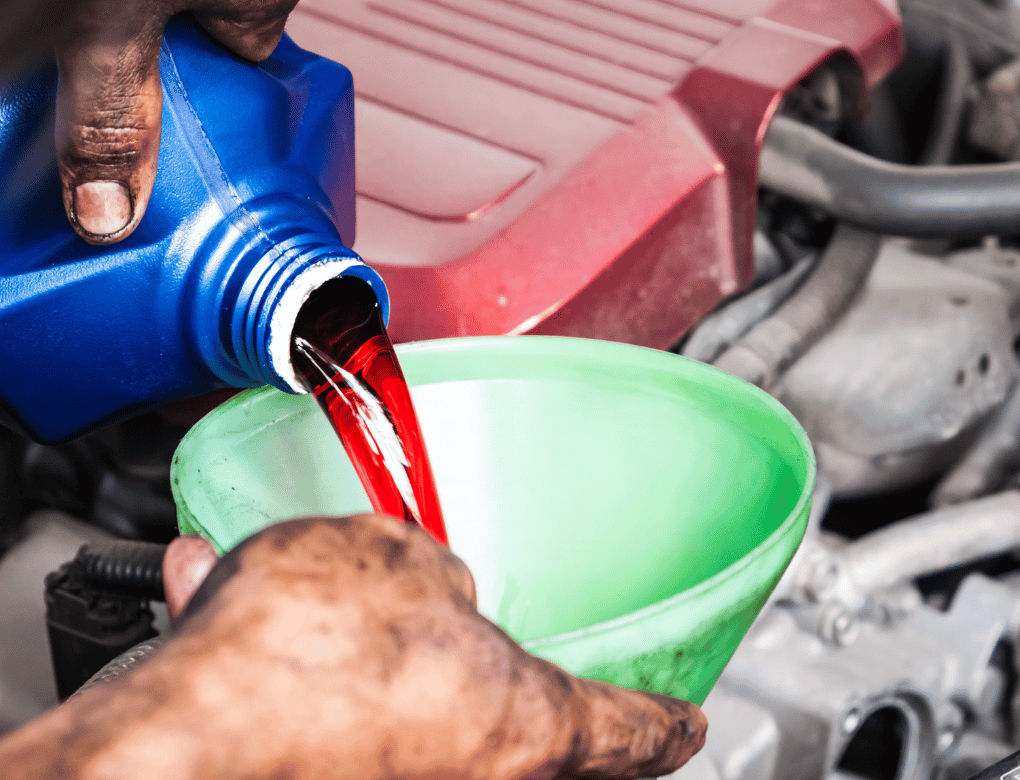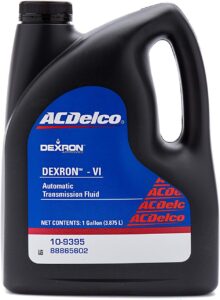Dexron HP vs Dexron VI: ATF Comparison And Usage Guidelines
Dexron Xp and Dexron VI are both Automatic Transmission Fluid (ATF). Dexron VI is a newer upgraded version of Dexron XP. However, Dexron VI are more advanced and updated version of transmission fluid.
The battle for supremacy in transmission fluids between the advanced Dexron HP benefits and the proven Dexron VI advantages can be complex, but essential for a well-informed decision. This transmission fluid comparison is geared towards helping vehicle owners navigate the subtle nuances of these products, facilitating the process of choosing between Dexron HP and Dexron VI for their specific automotive needs.
Note: If you want to use a different ATF instead of your existing ATF, do not decide too early. We recommend reading the full guidelines before you decide. If you want to know specific details, you can use our Table of Contents section for the exact information you want to know. Or you can use our FAQ section for more short answers.
Dexron HP vs Dexron VI: ATF Comparisons

Within the realm of automotive maintenance, choosing the right transmission fluid is pivotal for ensuring the smooth operation and longevity of your vehicle’s transmission system. With General Motors’ rich history of innovative fluid technology, drivers today are faced with options like Dexron HP and Dexron VI, each offering their respective benefits and advantages.
Key Takeaways
- Understanding the distinct features of Dexron HP can significantly enhance performance and durability for 8-speed transmissions.
- Dexron VI advantages include improved performance for 6-speed transmissions and extended transmission life.
- A comprehensive comparison is crucial for choosing between Dexron HP and Dexron VI, depending on vehicle specifications.
- The right ATF selection can contribute to better vehicle efficiency and longer transmission service intervals.
- Consulting the vehicle’s manual or a professional mechanic is key before transitioning between ATF types.
- Both fluids play a critical role in maintaining transmission health, but it’s important to discern which is most suitable for your vehicle.

The Evolution of Dexron Transmission Fluids
The journey of Dexron transmission fluids is a testament to General Motors’ commitment to innovation in automotive lubrication. Originally formulated to address the operational challenges of automatic transmissions, Dexron fluids have undergone considerable modification over the decades, reflecting both technological progression in vehicle engineering and evolving industry standards.
The Inception of Dexron Fluids and Initial Applications
General Motors introduced the worlds to Dexron-automatic transmission fluid back in the late 1960s. Its creation was influenced by the need to provide a consistent and reliable fluid capable of sustaining complex transmission mechanics under a variety of driving conditions. These initial formulations set a new benchmark in ATF performance, and swiftly became the fluid of choice for an increasing number of automakers.
Advancements from Dexron-II to Dexron-VI and Beyond
With each iteration of Dexron, from Dexron-II to Dexron-VI, remarkable enhancements were observed in viscosity, thermal resistance, and overall efficiency. Notably, Dexron-VI, representing a significant advancement over its predecessors, became quintessential for GM’s 6-speed automatic transmissions, and boasted backward compatibility with older Dexron types.
Impact on Transmission Technology: Old vs New Specifications
GM’s leap towards high-performance transmissions for electric and hybrid vehicles called for fluids with ever tighter specifications, such as Dexron-VI and Dexron HP. The distinction between these fluids is not just encapsulated in their intended use but also in their compatibility with legacy models. Despite Dexron hp vs dexron vi debates, it is widely acknowledged that Dexron HP specifications adequately match the needs of the latest transmission technologies without forsaking those of yesteryears’ designs.
| Specification | Dexron-VI | Dexron HP |
|---|---|---|
| Viscosity (cSt) | ~5.5 cSt | Specific to 8-speed |
| Compatibility | Backward compatible with previous Dexron fluids | Reported to work efficiently even in transmissions designed for Dexron VI |
| Design Intention | Formulated for 6-speed transmissions | Created for modern 8-speed transmissions |
| Thermal Stability | Improved from previous versions | Exceptional high-temperature performance |
| Durability | Extended transmission life | Enhanced performance and longevity |
In evaluating differences between dexron hp and dexron vi and making a transmission fluid comparison, it becomes clear that Dexron HP compatibility stretches to fit a wide array of transmission systems, much like the universal appeal that Dexron VI compatibility has enjoyed.
The progression of Dexron fluids elucidates GM’s continuous strive for excellence and their dedication to meet the demanding specifications of modern vehicle transmissions.
Dexron HP vs Dexron VI: Key Features and Differentiation

When it comes to selecting the right Automatic Transmission Fluid (ATF) for your vehicle, understanding the differences between Dexron HP and Dexron VI is critical. A transmission fluid comparison reveals that both fluids cater to distinct specifications designed by General Motors, yet they have unique characteristics that influence the health and performance of a vehicle’s transmission system.
Dexron HP, known for its excellent high-temperature performance, is a fully synthetic ATF created specifically for certain 8-speed automatic transmissions. It outshines in delivering superior protection and extended transmission longevity. Contrastingly, Dexron VI is tailored for 6-speed transmissions and has a slightly lower viscosity.
While it is praised for boosting vehicle efficiency and transmission durability, it is recommended for usages up to 60,000 miles. The choice between these two fluids should be guided primarily by the manufacturer’s recommendations and the specificities of your vehicle’s transmission.
| Property | Dexron HP | Dexron VI |
|---|---|---|
| Base oil type | Fully synthetic | Synthetic blend |
| Design For | 8-speed transmissions | 6-speed transmissions |
| Viscosity | Higher | Lower |
| High-Temperature Performance | Excellent | Good |
| Longevity | Enhanced, with longer service intervals | Standard service intervals |
| Price Point | Higher | More economical |
| Compatibility | Specific GM 8-speed transmissions | Older versions and certain non-GM vehicles |

The cost differential between Dexron HP and Dexron VI is also a consideration. While Dexron HP can come at a higher price point, it is justified by its extended service intervals which may lead to long-term economic benefits.
Yet, regardless of cost, what remains paramount is adhering to the vehicle’s manual guidelines to ensure the transmission fluid used is well-suited for the vehicle’s specific transmission type.
The distinctions between Dexron HP and Dexron VI highlight the advance in automotive fluid technology, illustrating that even subtle variances in transmission fluid properties can result in significant differences in vehicle performance.
Choosing Between Dexron HP and Dexron VI for Your Vehicle
When faced with the decision of selecting the right transmission fluid for your car, the choice between Dexron HP and Dexron VI hinges on understanding their respective benefits and compatibilities. Both fluids are reputed for their high-quality performance in automatic transmissions, yet they cater to different types of vehicles and transmission technologies.
Dexron HP Compatibility and Benefits
Dexron HP stands out for its advanced formulation, providing numerous benefits for vehicles with 8 and 9-speed transmissions. Not only is it suitable for the latest GM models, but its compatibility extends to several older models from various manufacturers. Here are some of the key Dexron HP benefits that make it a compelling option for owners of compatible vehicles:
- Enhanced thermal stability for improved high-temperature operation
- Excellent lubrication qualities to minimize wear and tear
- Potential for better fuel economy due to its advanced formulation
Dexron VI Advantages and Usage Guidelines
Dexron VI, on the other hand, is primarily proposed for vehicles with 6-speed automatic transmissions. The fluid’s advantages lie in its improved viscosity and shift performance, contributing to a smoother vehicle operation.
Nonetheless, understanding Dexron VI compatibility is vital as it may not be suited for use where Dexron HP is recommended. Below are several Dexron VI advantages that justify its selection over other fluids:
- Enhanced stability and longevity of the transmission fluid
- Improved shift quality and reduced transmission shudder
- Compliance with older vehicle specifications while offering upgraded performance
Performance and Durability Comparisons
In assessing the performance and durability of Dexron HP versus Dexron VI, a few critical points emerge. Differences between Dexron HP and Dexron VI are most prominently seen in the types of transmissions they are engineered for.
Dexron VI marked a significant upgrade in performance and durability for 6-speed transmissions, while Dexron HP takes it a step further, catering specifically to the more demanding needs of 8-speed transmissions. The following table contrasts the key attributes of each fluid to aid in choosing between Dexron HP and Dexron VI.
| Attribute | Dexron HP | Dexron VI |
|---|---|---|
| Transmission Compatibility | 8 and 9-speed automatics | 6-speed automatics |
| Key Benefits | Superior thermal stability, fuel efficiency, advanced lubrication | Improved fluid longevity, better shift performance |
| Primary Vehicle Types | Modern GM vehicles, select models from other manufacturers | Primarily older GM models, compatible with various vehicles requiring Dexron VI |
| Economic Consideration | Potentially higher upfront cost with long-term benefits | More cost-effective with significant performance improvements |
In summary, while both Dexron HP and Dexron VI serve the purpose of optimizing transmission performance and durability, they do so for distinctly different vehicle requirements. Understanding your vehicle’s specific needs according to the manufacturer’s guidelines will ensure the most informed and beneficial choice in transmission fluid.
Conclusion
The debate regarding Dexron HP vs Dexron VI is more than just technical jargon; it’s about making the right choice for your vehicle’s longevity and performance. As we’ve delved into the differences and shared characteristics between these two Automatic Transmission Fluids (ATFs), it’s become clear that the selection process is crucial.
Dexron HP, with its cutting-edge formulation, stands out for modern high-performance transmissions, delivering efficiency and durability for today’s complex automotive engineering.
Dexron VI, on the other hand, remains a stalwart for vehicles designed with earlier 6-speed automatic transmissions, ensuring smooth operation and resistance to wear and tear.
While the transmission fluid comparison has highlighted the unique features of each ATF, the end goal is the same—providing optimal care for your vehicle’s transmission system.
Therefore, choosing between Dexron hp and Dexron vi should be a well-informed decision, guided by the manufacturer’s specifications and possibly the advice of a trusted mechanic.
FAQ
What are the primary differences between Dexron HP and Dexron VI transmission fluids?
Dexron HP is a fully synthetic fluid specifically designed for GM’s 8-speed transmissions, offering improved high-temperature performance and longevity. Dexron VI is also synthetic but aimed at 6-speed transmissions and is recognized for enhancing vehicle efficiency and transmission durability. Dexron HP is generally more advanced and suitable for newer vehicle models.
Can Dexron VI be used in vehicles that require Dexron HP?
No, it is not recommended to use Dexron VI in vehicles that require Dexron HP. Each fluid is formulated for specific transmission types and using the incorrect fluid can affect vehicle performance and potentially cause damage to the transmission.
What are the advantages of using Dexron HP in a vehicle?
Dexron HP provides exceptional thermal stability, superior lubrication, and can contribute to reduced fuel consumption. It’s designed to meet the demands of more recent and high-performance GM 8-speed transmissions for better gear shift responses and efficiency.
Are Dexron HP and Dexron VI transmission fluids backward compatible with older Dexron specifications?
Dexron VI is backward compatible with older Dexron specifications. While Dexron HP is suitable for a range of applications and can potentially be used in older transmissions, it is essential to always follow the vehicle manufacturer’s recommendations to ensure compatibility.
How do I choose between Dexron HP and Dexron VI for my vehicle?
The choice between Dexron HP and Dexron VI should be based on the vehicle’s manufacturer recommendations found in the vehicle’s manual. The design and specifications of the transmission fluid need to align with the intended use and the specific requirements of the vehicle’s transmission.
What are the benefits of using Dexron VI transmission fluid?
Dexron VI helps to improve shift performance, offers increased fluid durability, and can lead to better vehicle fuel efficiency. It is also formulated to prevent sludge and varnish buildup, prolonging transmission life, particularly in 6-speed automatic transmissions.
Is there a significant price difference between Dexron HP and Dexron VI?
Yes, Dexron HP typically comes at a higher cost compared to Dexron VI due to its advanced formulation and intended use for newer, high-performance transmissions. However, the extended service intervals of Dexron HP may offer long-term economic benefits.
What does the term ‘fully synthetic’ mean when referring to Dexron HP?
‘Fully synthetic’ in relation to Dexron HP indicates that the fluid is made from synthetic base oils and additives, as opposed to being derived from crude oil. This offers advantages in terms of performance, such as enhanced stability at high temperatures and extended lifespan.
Can I switch between Dexron HP and Dexron VI fluids?
Switching between Dexron HP and Dexron VI should be done with caution and preferably under the guidance of a professional mechanic or by strictly following the manufacturer’s guidelines. Compatibility is key, and using the wrong type of fluid could result in subpar performance or damage to the transmission.
What is the recommended service interval for Dexron HP and Dexron VI fluids?
The service interval for transmission fluids like Dexron HP and Dexron VI can vary based on the vehicle model and operating conditions. Generally, Dexron HP is formulated for extended service intervals, which can offer cost savings over time despite its higher initial price. Always refer to the vehicle’s manual for specific service interval recommendations.
function combar_faq_schema_mZk64999() { if (is_single()) { ?>



